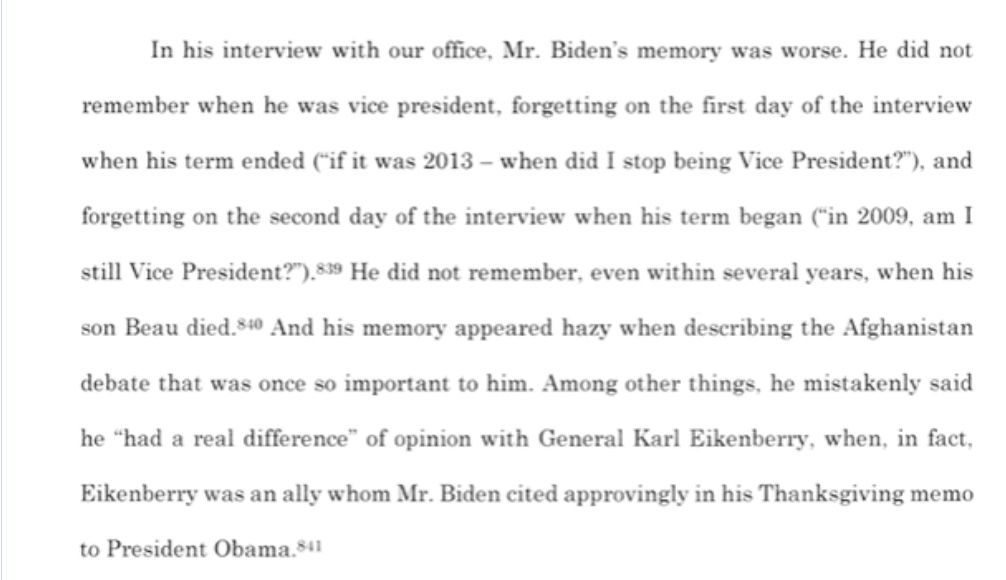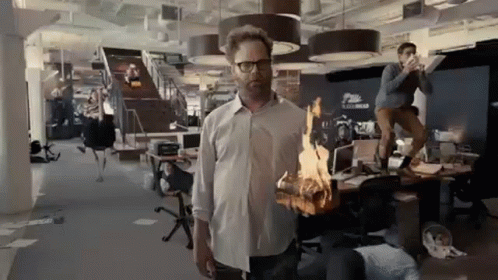Classified files found at President's former office...
-
Attorneys for President Joe Biden and the special counsel appointed to investigate his handling of classified documents have been negotiating for about a month over the terms under which he would be interviewed, two people familiar with the matter said.
Discussions between Biden’s lawyers and special counsel Robert Hur’s office are focused on how, when and where the interview might take place, as well as the scope of the questions, these people said. They stressed that the negotiations are ongoing and that no agreement has been reached.
The back-and-forth suggests that the probe — now in its eighth month — may not be wrapping up imminently. But an interview with the person at the center of an investigation typically takes place near the end of the process.
A spokesperson for Biden’s personal attorney, Bob Bauer, declined to comment Thursday, as did a spokesperson for Hur.
-
-
Biden's practices "present serious risks to national security,"
Special counsel Robert Hur has declined to prosecute President Joe Biden for his handling of classified documents, but said Biden's practices "present serious risks to national security," and added that Biden portrayed himself as an "elderly man with a poor memory" who would be sympathetic to a jury.
"Our investigation uncovered evidence that President Biden willfully retained and disclosed classified materials after his vice presidency when he was a private citizen," the report said, but the evidence "does not establish Mr. Biden's guilt beyond a reasonable doubt."
About a month after he left office as vice president, in a recorded conversation with his ghostwriter in February 2017, Biden remarked that he “just found all this classified stuff downstairs," the report said. Biden was believed to have been referencing classified documents about the Afghanistan troop surge in 2009, which Biden opposed.
Bidens’ memory, Hur’s report said, “was significantly limited” during his 2023 interviews with the special counsel.
"We have also considered that, at trial, Mr. Biden would likely present himself to a jury, as he did during our interview of him, as a sympathetic, well-meaning, elderly man with a poor memory," it said. "Based on our direct interactions with and observations of him, he is someone for whom many jurors will want to identify reasonable doubt. It would be difficult to convince a jury that they should convict him — by then a former president well into his eighties — of a serious felony that requires a mental state of willfulness."
Later in the report, the special counsel said that the president's memory was "worse" during their interview with him, compared to his memory in recorded conversations from 2017.
"He did not remember when he was vice president, forgetting on the first day of the interview when his term ended ('if it was 2013 — when did I stop being Vice President?'), and forgetting on the second day of the interview when his term began ('in 2009, am I still Vice President?')," the report said.
Biden also had difficulty remembering the timing of his son Beau's death, as well as a debate about Afghanistan.
"He did not remember, even within several years, when his son Beau died," the report said.
So, you can excuse the old fart because he's an old geezer who can't remember shit.
-
BTW: It's DOJ policy not to prosecute sitting presidents.
I wonder what the statute of limitations would be in this case...
@George-K said in Classified files found at President's former office...:
BTW: It's DOJ policy not to prosecute sitting presidents.
I wonder what the statute of limitations would be in this case...
Twice that was determined as DoJ policy - once under Nixon, once under Trump.
-
And so begins the process of replacing Biden on the ticket.
-
Biden's practices "present serious risks to national security,"
Special counsel Robert Hur has declined to prosecute President Joe Biden for his handling of classified documents, but said Biden's practices "present serious risks to national security," and added that Biden portrayed himself as an "elderly man with a poor memory" who would be sympathetic to a jury.
"Our investigation uncovered evidence that President Biden willfully retained and disclosed classified materials after his vice presidency when he was a private citizen," the report said, but the evidence "does not establish Mr. Biden's guilt beyond a reasonable doubt."
About a month after he left office as vice president, in a recorded conversation with his ghostwriter in February 2017, Biden remarked that he “just found all this classified stuff downstairs," the report said. Biden was believed to have been referencing classified documents about the Afghanistan troop surge in 2009, which Biden opposed.
Bidens’ memory, Hur’s report said, “was significantly limited” during his 2023 interviews with the special counsel.
"We have also considered that, at trial, Mr. Biden would likely present himself to a jury, as he did during our interview of him, as a sympathetic, well-meaning, elderly man with a poor memory," it said. "Based on our direct interactions with and observations of him, he is someone for whom many jurors will want to identify reasonable doubt. It would be difficult to convince a jury that they should convict him — by then a former president well into his eighties — of a serious felony that requires a mental state of willfulness."
Later in the report, the special counsel said that the president's memory was "worse" during their interview with him, compared to his memory in recorded conversations from 2017.
"He did not remember when he was vice president, forgetting on the first day of the interview when his term ended ('if it was 2013 — when did I stop being Vice President?'), and forgetting on the second day of the interview when his term began ('in 2009, am I still Vice President?')," the report said.
Biden also had difficulty remembering the timing of his son Beau's death, as well as a debate about Afghanistan.
"He did not remember, even within several years, when his son Beau died," the report said.
So, you can excuse the old fart because he's an old geezer who can't remember shit.
-
Oh my...
Biden’s ghostwriter deleted audio recordings after appointment of special prosecutor
This was a serious revelation: Joe Biden’s ghostwriter for his memoir, Promise Me, Dad, Mark Zwonitzer, “deleted digital audio recordings of his conversations with Mr. Biden” after “learning of Special Counsel Hur’s appointment”. The report goes on to stress that the recordings had major evidentiary value. FBI investigators who received a laptop Mr Zwonitzer voluntarily turned over were, however, able to recover the recordings and the author himself turned over “near-verbatim transcripts he made of some of the recordings”, which investigators said he made no attempts to destroy.
For that latter reason, Mr Zwonitzer was not recommended to be charged either; investigators wrote that the “available evidence cannot establish beyond a reasonable doubt that Zwonitzer did so with the intent to impede, obstruct, or influence this federal investigation.”
"Major evidentiary value."


